简爱性格特征
简爱第十八章人物分析
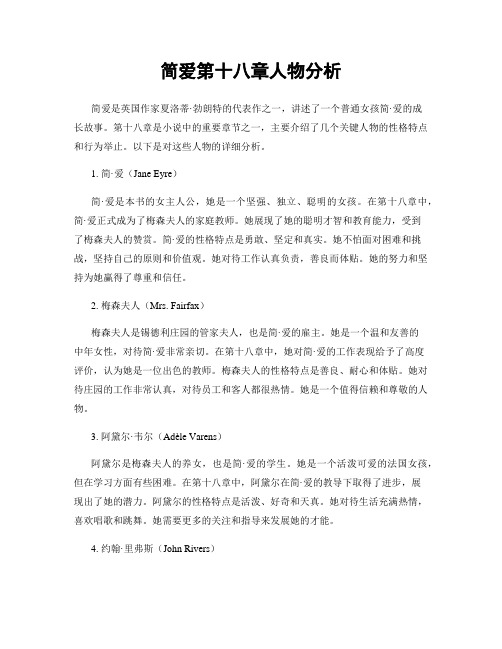
简爱第十八章人物分析简爱是英国作家夏洛蒂·勃朗特的代表作之一,讲述了一个普通女孩简·爱的成长故事。
第十八章是小说中的重要章节之一,主要介绍了几个关键人物的性格特点和行为举止。
以下是对这些人物的详细分析。
1. 简·爱(Jane Eyre)简·爱是本书的女主人公,她是一个坚强、独立、聪明的女孩。
在第十八章中,简·爱正式成为了梅森夫人的家庭教师。
她展现了她的聪明才智和教育能力,受到了梅森夫人的赞赏。
简·爱的性格特点是勇敢、坚定和真实。
她不怕面对困难和挑战,坚持自己的原则和价值观。
她对待工作认真负责,善良而体贴。
她的努力和坚持为她赢得了尊重和信任。
2. 梅森夫人(Mrs. Fairfax)梅森夫人是锡德利庄园的管家夫人,也是简·爱的雇主。
她是一个温和友善的中年女性,对待简·爱非常亲切。
在第十八章中,她对简·爱的工作表现给予了高度评价,认为她是一位出色的教师。
梅森夫人的性格特点是善良、耐心和体贴。
她对待庄园的工作非常认真,对待员工和客人都很热情。
她是一个值得信赖和尊敬的人物。
3. 阿黛尔·韦尔(Adèle Varens)阿黛尔是梅森夫人的养女,也是简·爱的学生。
她是一个活泼可爱的法国女孩,但在学习方面有些困难。
在第十八章中,阿黛尔在简·爱的教导下取得了进步,展现出了她的潜力。
阿黛尔的性格特点是活泼、好奇和天真。
她对待生活充满热情,喜欢唱歌和跳舞。
她需要更多的关注和指导来发展她的才能。
4. 约翰·里弗斯(John Rivers)约翰·里弗斯是一个年轻的牧师,也是简·爱在第十八章中遇到的一个重要人物。
他是一个严肃认真的人,对待工作和信仰非常投入。
在第十八章中,他对简·爱的教育能力表示赞赏,并邀请她到印度做教师。
约翰·里弗斯的性格特点是严谨、坚定和热情。
关于简爱的性格特点
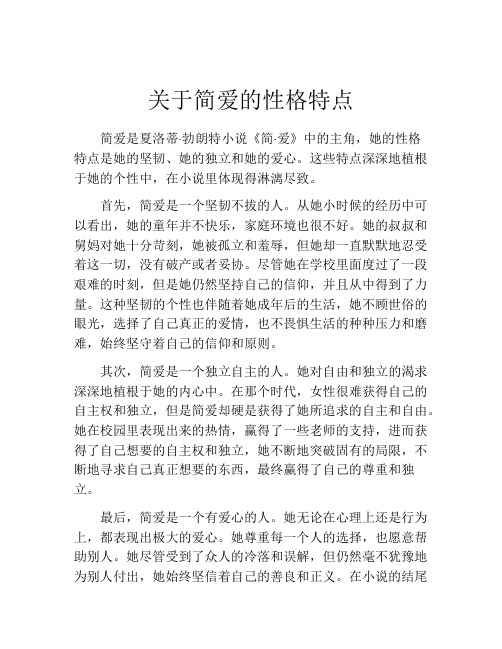
关于简爱的性格特点简爱是夏洛蒂·勃朗特小说《简·爱》中的主角,她的性格特点是她的坚韧、她的独立和她的爱心。
这些特点深深地植根于她的个性中,在小说里体现得淋漓尽致。
首先,简爱是一个坚韧不拔的人。
从她小时候的经历中可以看出,她的童年并不快乐,家庭环境也很不好。
她的叔叔和舅妈对她十分苛刻,她被孤立和羞辱,但她却一直默默地忍受着这一切,没有破产或者妥协。
尽管她在学校里面度过了一段艰难的时刻,但是她仍然坚持自己的信仰,并且从中得到了力量。
这种坚韧的个性也伴随着她成年后的生活,她不顾世俗的眼光,选择了自己真正的爱情,也不畏惧生活的种种压力和磨难,始终坚守着自己的信仰和原则。
其次,简爱是一个独立自主的人。
她对自由和独立的渴求深深地植根于她的内心中。
在那个时代,女性很难获得自己的自主权和独立,但是简爱却硬是获得了她所追求的自主和自由。
她在校园里表现出来的热情,赢得了一些老师的支持,进而获得了自己想要的自主权和独立,她不断地突破固有的局限,不断地寻求自己真正想要的东西,最终赢得了自己的尊重和独立。
最后,简爱是一个有爱心的人。
她无论在心理上还是行为上,都表现出极大的爱心。
她尊重每一个人的选择,也愿意帮助别人。
她尽管受到了众人的冷落和误解,但仍然毫不犹豫地为别人付出,她始终坚信着自己的善良和正义。
在小说的结尾处,简爱得到了一系列的惊喜,她的坚韧、独立和爱心也得到了最好的证明。
综上所述,简爱是一个有着坚韧、独立和爱心等各种性格特点的人。
这些特点影响了她的一生,也成为了小说中的独特性格亮点。
她不仅是一个刻板的角色,更是一个充满生命力和勇气的人,展现出了人性的许多维度。
简爱的性格在不同时期有很大的变化
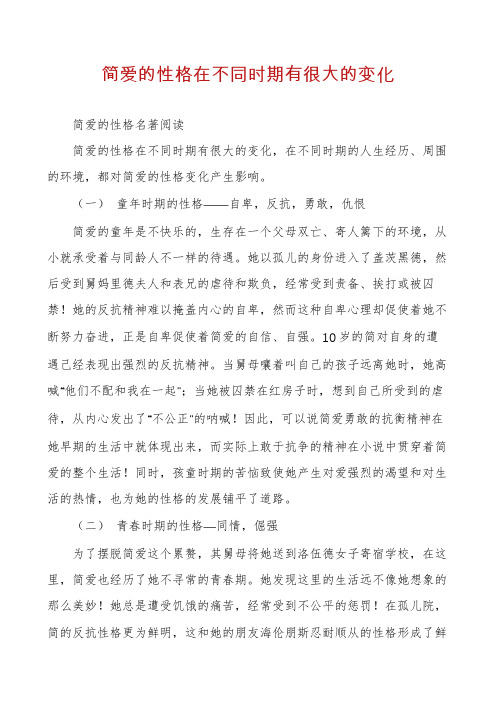
简爱的性格在不同时期有很大的变化简爱的性格名著阅读简爱的性格在不同时期有很大的变化,在不同时期的人生经历、周围的环境,都对简爱的性格变化产生影响。
(一)童年时期的性格――自卑,反抗,勇敢,仇恨简爱的童年是不快乐的,生存在一个父母双亡、寄人篱下的环境,从小就承受着与同龄人不一样的待遇。
她以孤儿的身份进入了盖茨黑德,然后受到舅妈里德夫人和表兄的虐待和欺负,经常受到责备、挨打或被囚禁!她的反抗精神难以掩盖内心的自卑,然而这种自卑心理却促使着她不断努力奋进,正是自卑促使着简爱的自信、自强。
10岁的简对自身的遭遇己经表现出强烈的反抗精神。
当舅母嚷着叫自己的孩子远离她时,她高喊“他们不配和我在一起”;当她被囚禁在红房子时,想到自己所受到的虐待,从内心发出了“不公正”的呐喊!因此,可以说简爱勇敢的抗衡精神在她早期的生活中就体现出来,而实际上敢于抗争的精神在小说中贯穿着简爱的整个生活!同时,孩童时期的苦恼致使她产生对爱强烈的渴望和对生活的热情,也为她的性格的发展铺平了道路。
(二)青春时期的性格―同情,倔强为了摆脱简爱这个累赘,其舅母将她送到洛伍德女子寄宿学校,在这里,简爱也经历了她不寻常的青春期。
她发现这里的生活远不像她想象的那么美妙!她总是遭受饥饿的痛苦,经常受到不公平的惩罚!在孤儿院,简的反抗性格更为鲜明,这和她的朋友海伦朋斯忍耐顺从的性格形成了鲜明的对比。
海伦朋斯虽遭迫害却信奉“爱你的仇人”,在宗教的麻痹下没有仇恨,只有逆来顺受。
而简对冷酷的校长和摧残她们的教师深恶痛绝。
她对海伦说:“假如她用那根条子打我,我要从她手里把它夺过来,并且当面折断它。
”充分表露了她不甘屈辱和不向命运妥协的倔强性格。
同时对于海伦的遭遇和死亡简爱流露出很大的同情。
作为一个孩子,她总是用严肃的眼光简爱的性格名著阅读盯住他们的行为和语言,对他们的虐待和欺凌充满了仇恨!(三)成年时期的性格―敢爱,真挚当简爱成年之后,在桑菲尔德庄园成为了Adele的家庭女教师。
浅析简爱的人物性格特征
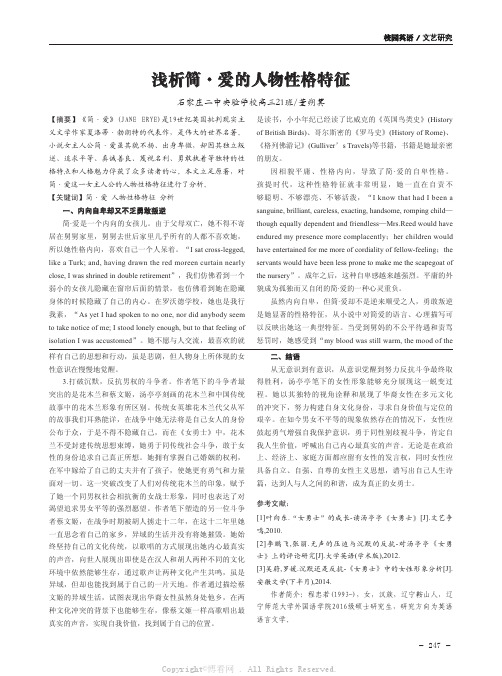
- 247 -校园英语 / 文艺研究样有自己的思想和行动,虽是悲剧,但人物身上所体现的女性意识在慢慢地觉醒。
3.打破沉默,反抗男权的斗争者。
作者笔下的斗争者最突出的是花木兰和蔡文姬,汤亭亭刻画的花木兰和中国传统故事中的花木兰形象有所区别。
传统女英雄花木兰代父从军的故事我们耳熟能详,在战争中她无法将是自己女人的身份公布于众,于是不得不隐藏自己,而在《女勇士》中,花木兰不受封建传统思想束缚,她勇于同传统社会斗争,敢于女性的身份追求自己真正所想。
她拥有掌握自己婚姻的权利,在军中嫁给了自己的丈夫并有了孩子,使她更有勇气和力量面对一切。
这一突破改变了人们对传统花木兰的印象,赋予了她一个同男权社会相抗衡的女战士形象,同时也表达了对渴望追求男女平等的强烈愿望。
作者笔下塑造的另一位斗争者蔡文姬,在战争时期被胡人掳走十二年,在这十二年里她一直思念着自己的家乡,异域的生活并没有将她摧毁。
她始终坚持自己的文化传统,以歌唱的方式展现出她内心最真实的声音,向世人展现出即使是在汉人和胡人两种不同的文化环境中依然能够生存,通过歌声让两种文化产生共鸣,虽是异域,但却也能找到属于自己的一片天地。
作者通过描绘蔡文姬的异域生活,试图表现出华裔女性虽然身处他乡,在两种文化冲突的背景下也能够生存,像蔡文姬一样高歌唱出最真实的声音,实现自我价值,找到属于自己的位置。
浅析简·爱的人物性格特征石家庄二中实验学校高三21班/董朔萁【摘要】《简·爱》(JANE ERYE)是19世纪英国批判现实主义文学作家夏洛蒂·勃朗特的代表作,是伟大的世界名著。
小说女主人公简·爱虽其貌不扬、出身卑微,却因其独立叛逆、追求平等、真诚善良、蔑视名利、勇敢执着等独特的性格特点和人格魅力俘获了众多读者的心。
本文立足原著,对简·爱这一女主人公的人物性格特征进行了分析。
【关键词】简·爱 人物性格特征 分析一、内向自卑却又不乏勇敢叛逆简·爱是一个内向的女孩儿。
简爱人物分析
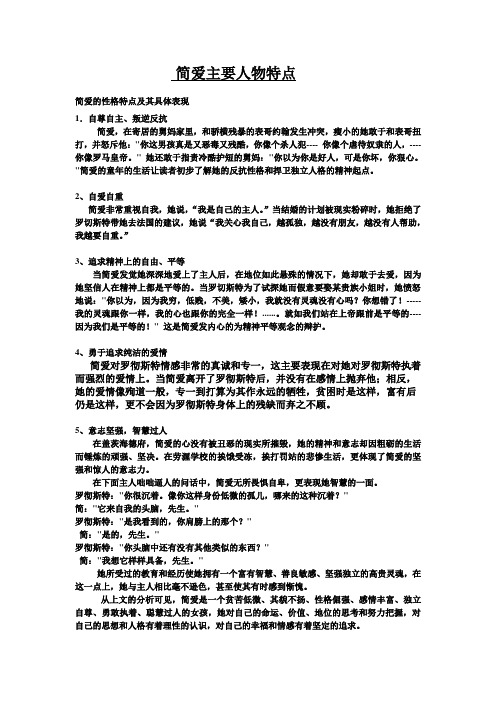
简爱主要人物特点简爱的性格特点及其具体表现1.自尊自主、叛逆反抗简爱,在寄居的舅妈家里,和骄横残暴的表哥约翰发生冲突,瘦小的她敢于和表哥扭打,并怒斥他:"你这男孩真是又恶毒又残酷,你像个杀人犯---- 你像个虐待奴隶的人,----你像罗马皇帝。
" 她还敢于指责冷酷护短的舅妈:"你以为你是好人,可是你坏,你狠心。
"简爱的童年的生活让读者初步了解她的反抗性格和捍卫独立人格的精神起点。
2、自爱自重简爱非常重视自我,她说,“我是自己的主人。
”当结婚的计划被现实粉碎时,她拒绝了罗切斯特带她去法国的建议,她说“我关心我自己,越孤独,越没有朋友,越没有人帮助,我越要自重。
”3、追求精神上的自由、平等当简爱发觉她深深地爱上了主人后,在地位如此悬殊的情况下,她却敢于去爱,因为她坚信人在精神上都是平等的。
当罗切斯特为了试探她而假意要娶某贵族小姐时,她愤怒地说:"你以为,因为我穷,低贱,不美,矮小,我就没有灵魂没有心吗?你想错了!-----我的灵魂跟你一样,我的心也跟你的完全一样!......。
就如我们站在上帝跟前是平等的----因为我们是平等的!" 这是简爱发内心的为精神平等观念的辩护。
4、勇于追求纯洁的爱情简爱对罗彻斯特情感非常的真诚和专一,这主要表现在对她对罗彻斯特执着而强烈的爱情上。
当简爱离开了罗彻斯特后,并没有在感情上抛弃他;相反,她的爱情像殉道一般,专一到打算为其作永远的牺牲,贫困时是这样,富有后仍是这样,更不会因为罗彻斯特身体上的残缺而弃之不顾。
5、意志坚强,智慧过人在盖茨海德府,简爱的心没有被丑恶的现实所摧毁,她的精神和意志却因粗砺的生活而锤炼的顽强、坚决。
在劳渥学校的挨饿受冻,挨打罚站的悲惨生活,更体现了简爱的坚强和惊人的意志力。
在下面主人咄咄逼人的问话中,简爱无所畏惧自卑,更表现她智慧的一面。
罗彻斯特:"你很沉着。
像你这样身份低微的孤儿,哪来的这种沉着?"简:"它来自我的头脑,先生。
简爱人物性格特点

简爱人物性格特点
《简爱》中简爱的人物性格特点是:
1、自尊自主、叛逆反抗。
简爱在寄居的舅妈家里敢于和骄横残暴的表哥约翰发生冲突,具反抗性格和捍卫独立人格的精神。
2、追求精神上的自由、平等。
当简爱发觉她爱上了主人后,在地位悬殊的情况下,她敢于去爱,因为她坚信人在精神上都是平等的。
3、意志坚强,智慧过人。
在慈善学校的悲惨体验,表现了简爱的坚强和惊人的意志力。
简爱凭借顽强的生命力在这种艰苦的条件下呆了10年。
4、感情炽烈,敢于追求真正意义上、完整的爱情。
得知罗彻斯特还有疯了的合
法妻子,她拒绝了他的爱,她不愿作人情妇,她要的还是一份真正意义的完整爱情。
然而,当简爱离开了罗彻斯特后,并没有在感情上抛弃他;相反,她的爱情像殉道一般,专一到打算为其作永远的牺牲,贫困时是这样,富有后仍是这样,更不会因为罗彻斯特身体上的残缺而弃之不顾。
浅谈《简爱》中简爱性格的多面性

浅谈《简爱》中简爱性格的多面性一、本文概述《简爱》是十九世纪英国女作家夏洛蒂·勃朗特的一部脍炙人口的长篇小说。
这部小说通过主人公简·爱坎坷不平的人生经历,成功地塑造了一个不安于现状、不甘受辱、自尊自爱、自立自强、敢于抗争、敢于追求的女性形象。
简·爱的性格具有多面性,她既坚韧又温柔,既理智又感性,既独立又依赖。
这些看似矛盾的性格特点在她身上得到了完美的融合,使得她成为文学史上一个独特而深刻的人物形象。
本文旨在通过深入分析《简爱》这部小说,探讨简·爱性格的多面性,从而揭示这一形象所蕴含的深刻内涵和价值意义。
我们将从简·爱的成长背景、爱情观、人生观等方面入手,全面解读她的性格特征,以期能够更深入地理解这一经典人物形象,并从中汲取启示和力量。
二、简爱的独立与自主在《简爱》这部作品中,简爱的独立与自主性格被表现得淋漓尽致。
她虽然身世悲惨,从小就失去了父母,被迫寄养在舅母家,忍受着舅母的虐待和表哥的欺侮,但她从未放弃过自己的尊严和独立。
当舅母将她送到洛伍德学校时,她并没有因此而屈服,反而以坚韧的毅力度过了那段艰难的日子。
在洛伍德学校,简爱经历了贫困、饥饿和疾病的洗礼,但她从未向命运低头。
她努力学习,不断提高自己,用知识和智慧武装自己。
这种独立和自主的精神,使得她在面对生活中的种种困境时,都能够保持冷静和理智,以积极的态度去面对和解决问题。
简爱的独立与自主还体现在她与罗切斯特的爱情关系上。
在面对罗切斯特的求婚时,她并没有因为自己的地位和金钱的差距而自卑或退缩,而是勇敢地表达了自己的真实感受。
她拒绝了罗切斯特的求婚,因为她认为爱情应该是建立在平等和尊重的基础上的。
这种独立和自主的精神,使得她在面对爱情时,能够坚守自己的原则和价值观,不被外界所左右。
简爱的独立与自主还体现在她对生活的态度上。
她不愿意过一种依附于别人的生活,而是希望通过自己的努力来实现自己的价值。
她勇敢地离开了罗切斯特,开始了自己的新生活。
简爱性格特点及对应情节
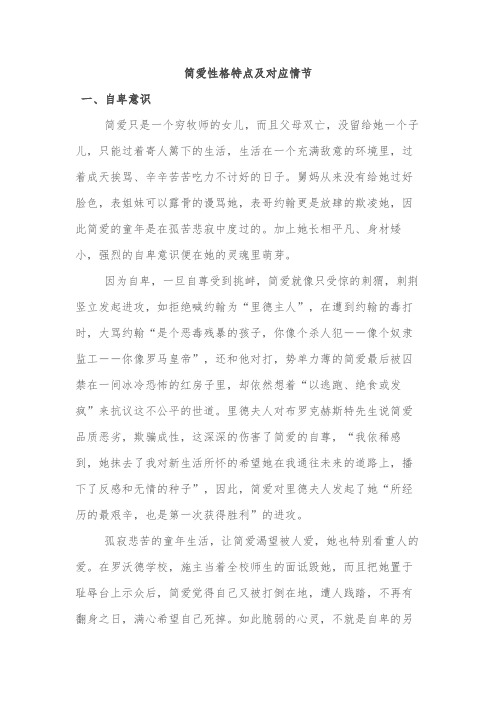
简爱性格特点及对应情节一、自卑意识简爱只是一个穷牧师的女儿,而且父母双亡,没留给她一个子儿,只能过着寄人篱下的生活,生活在一个充满敌意的环境里,过着成天挨骂、辛辛苦苦吃力不讨好的日子。
舅妈从来没有给她过好脸色,表姐妹可以露骨的谩骂她,表哥约翰更是放肆的欺凌她,因此简爱的童年是在孤苦悲寂中度过的。
加上她长相平凡、身材矮小,强烈的自卑意识便在她的灵魂里萌芽。
因为自卑,一旦自尊受到挑衅,简爱就像只受惊的刺猬,刺荆竖立发起进攻,如拒绝喊约翰为“里德主人”,在遭到约翰的毒打时,大骂约翰“是个恶毒残暴的孩子,你像个杀人犯――像个奴隶监工――你像罗马皇帝”,还和他对打,势单力薄的简爱最后被囚禁在一间冰冷恐怖的红房子里,却依然想着“以逃跑、绝食或发疯”来抗议这不公平的世道。
里德夫人对布罗克赫斯特先生说简爱品质恶劣,欺骗成性,这深深的伤害了简爱的自尊,“我依稀感到,她抹去了我对新生活所怀的希望她在我通往未来的道路上,播下了反感和无情的种子”,因此,简爱对里德夫人发起了她“所经历的最艰辛,也是第一次获得胜利”的进攻。
孤寂悲苦的童年生活,让简爱渴望被人爱,她也特别看重人的爱。
在罗沃德学校,施主当着全校师生的面诋毁她,而且把她置于耻辱台上示众后,简爱觉得自己又被打倒在地,遭人践踏,不再有翻身之日,满心希望自己死掉。
如此脆弱的心灵,不就是自卑的另一种表现吗?因为自卑,简爱渴望平等。
“是我的灵魂同你的灵魂在对话,就好象我们两个人穿过坟墓,站在上帝脚下,彼此平等――本来就如此!”简爱追求平等,可是自卑的心理让她无法坦然面对财产和地位的差距。
简爱敢于追求自己的幸福,但自卑意识仍然影响到她对婚姻的态度。
“要是上帝赐予我一点姿色和充足的财富,我会使你同我现在一样难分难舍”在谈及结婚饰品时,简爱拒绝钻石珠宝,在米尔科特给她买衣服时,简爱显得不安,“他给我买的东西越多,我的脸为恼恨和堕落感而更加烧灼得厉害了如果我有那么一点儿独立财产的话说实在的,我会心安理得的”当罗切斯特问她还需要什么时,她立刻回答:“你的尊重。
简爱主要人物性格特点及故事情节
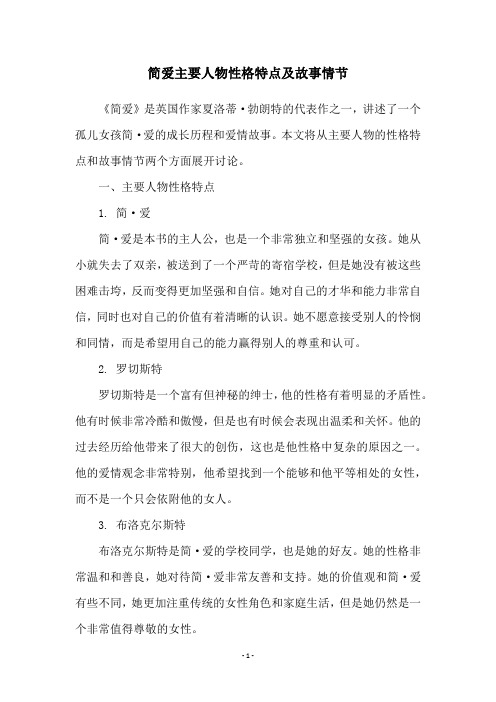
简爱主要人物性格特点及故事情节《简爱》是英国作家夏洛蒂·勃朗特的代表作之一,讲述了一个孤儿女孩简·爱的成长历程和爱情故事。
本文将从主要人物的性格特点和故事情节两个方面展开讨论。
一、主要人物性格特点1. 简·爱简·爱是本书的主人公,也是一个非常独立和坚强的女孩。
她从小就失去了双亲,被送到了一个严苛的寄宿学校,但是她没有被这些困难击垮,反而变得更加坚强和自信。
她对自己的才华和能力非常自信,同时也对自己的价值有着清晰的认识。
她不愿意接受别人的怜悯和同情,而是希望用自己的能力赢得别人的尊重和认可。
2. 罗切斯特罗切斯特是一个富有但神秘的绅士,他的性格有着明显的矛盾性。
他有时候非常冷酷和傲慢,但是也有时候会表现出温柔和关怀。
他的过去经历给他带来了很大的创伤,这也是他性格中复杂的原因之一。
他的爱情观念非常特别,他希望找到一个能够和他平等相处的女性,而不是一个只会依附他的女人。
3. 布洛克尔斯特布洛克尔斯特是简·爱的学校同学,也是她的好友。
她的性格非常温和和善良,她对待简·爱非常友善和支持。
她的价值观和简·爱有些不同,她更加注重传统的女性角色和家庭生活,但是她仍然是一个非常值得尊敬的女性。
二、故事情节1. 简·爱的成长历程简·爱从小就失去了双亲,被送到了一个严苛的寄宿学校。
在那里,她经历了很多苦难和挫折,但是她从来没有放弃过自己的梦想和希望。
她对自己的才华和能力非常自信,同时也对自己的价值有着清晰的认识。
她的坚强和独立给读者留下了深刻的印象。
2. 罗切斯特与简·爱的爱情故事罗切斯特是一个神秘的绅士,他的性格复杂而矛盾。
他与简·爱的相遇是一个意外,但是他们很快就发现彼此的相似之处。
他们的爱情经历了很多的波折和磨难,但是他们最终克服了一切困难,走到了一起。
罗切斯特的爱情观念非常特别,他希望找到一个能够和他平等相处的女性,而不是一个只会依附他的女人。
简爱性格及表现
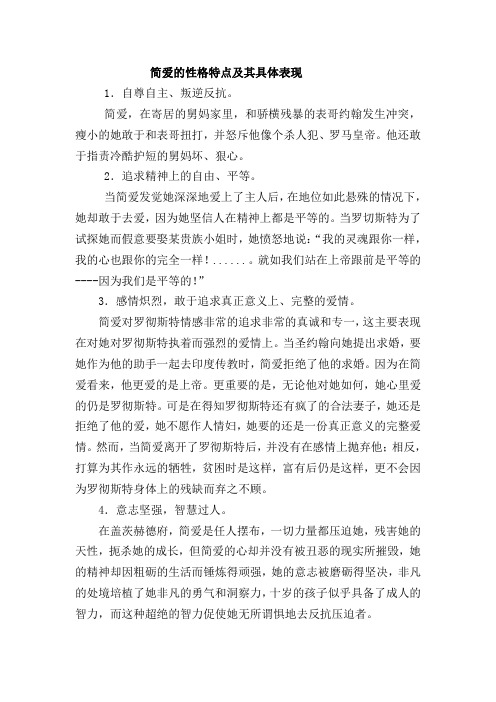
简爱的性格特点及其具体表现
1.自尊自主、叛逆反抗。
简爱,在寄居的舅妈家里,和骄横残暴的表哥约翰发生冲突,瘦小的她敢于和表哥扭打,并怒斥他像个杀人犯、罗马皇帝。
他还敢于指责冷酷护短的舅妈坏、狠心。
2.追求精神上的自由、平等。
当简爱发觉她深深地爱上了主人后,在地位如此悬殊的情况下,她却敢于去爱,因为她坚信人在精神上都是平等的。
当罗切斯特为了试探她而假意要娶某贵族小姐时,她愤怒地说:“我的灵魂跟你一样,我的心也跟你的完全一样!......。
就如我们站在上帝跟前是平等的----因为我们是平等的!”
3.感情炽烈,敢于追求真正意义上、完整的爱情。
简爱对罗彻斯特情感非常的追求非常的真诚和专一,这主要表现在对她对罗彻斯特执着而强烈的爱情上。
当圣约翰向她提出求婚,要她作为他的助手一起去印度传教时,简爱拒绝了他的求婚。
因为在简爱看来,他更爱的是上帝。
更重要的是,无论他对她如何,她心里爱的仍是罗彻斯特。
可是在得知罗彻斯特还有疯了的合法妻子,她还是拒绝了他的爱,她不愿作人情妇,她要的还是一份真正意义的完整爱情。
然而,当简爱离开了罗彻斯特后,并没有在感情上抛弃他;相反,打算为其作永远的牺牲,贫困时是这样,富有后仍是这样,更不会因为罗彻斯特身体上的残缺而弃之不顾。
4.意志坚强,智慧过人。
在盖茨赫德府,简爱是任人摆布,一切力量都压迫她,残害她的天性,扼杀她的成长,但简爱的心却并没有被丑恶的现实所摧毁,她的精神却因粗砺的生活而锤炼得顽强,她的意志被磨砺得坚决,非凡的处境培植了她非凡的勇气和洞察力,十岁的孩子似乎具备了成人的智力,而这种超绝的智力促使她无所谓惧地去反抗压迫者。
伦理学视角下简爱多重性格分析
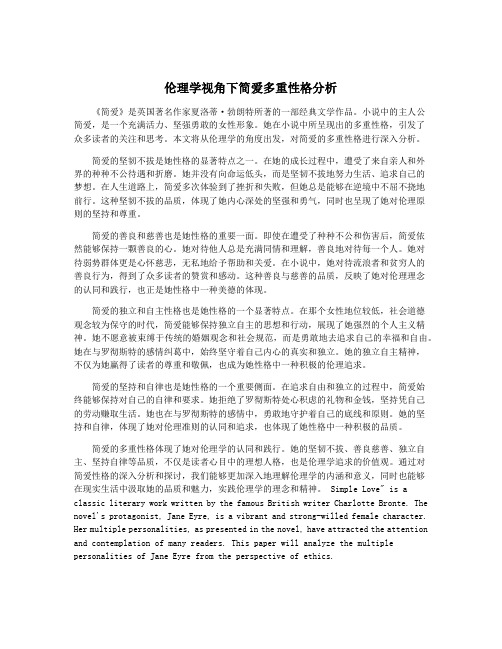
伦理学视角下简爱多重性格分析《简爱》是英国著名作家夏洛蒂·勃朗特所著的一部经典文学作品。
小说中的主人公简爱,是一个充满活力、坚强勇敢的女性形象。
她在小说中所呈现出的多重性格,引发了众多读者的关注和思考。
本文将从伦理学的角度出发,对简爱的多重性格进行深入分析。
简爱的坚韧不拔是她性格的显著特点之一。
在她的成长过程中,遭受了来自亲人和外界的种种不公待遇和折磨。
她并没有向命运低头,而是坚韧不拔地努力生活、追求自己的梦想。
在人生道路上,简爱多次体验到了挫折和失败,但她总是能够在逆境中不屈不挠地前行。
这种坚韧不拔的品质,体现了她内心深处的坚强和勇气,同时也呈现了她对伦理原则的坚持和尊重。
简爱的善良和慈善也是她性格的重要一面。
即使在遭受了种种不公和伤害后,简爱依然能够保持一颗善良的心。
她对待他人总是充满同情和理解,善良地对待每一个人。
她对待弱势群体更是心怀慈悲,无私地给予帮助和关爱。
在小说中,她对待流浪者和贫穷人的善良行为,得到了众多读者的赞赏和感动。
这种善良与慈善的品质,反映了她对伦理理念的认同和践行,也正是她性格中一种美德的体现。
简爱的独立和自主性格也是她性格的一个显著特点。
在那个女性地位较低,社会道德观念较为保守的时代,简爱能够保持独立自主的思想和行动,展现了她强烈的个人主义精神。
她不愿意被束缚于传统的婚姻观念和社会规范,而是勇敢地去追求自己的幸福和自由。
她在与罗彻斯特的感情纠葛中,始终坚守着自己内心的真实和独立。
她的独立自主精神,不仅为她赢得了读者的尊重和敬佩,也成为她性格中一种积极的伦理追求。
简爱的坚持和自律也是她性格的一个重要侧面。
在追求自由和独立的过程中,简爱始终能够保持对自己的自律和要求。
她拒绝了罗彻斯特处心积虑的礼物和金钱,坚持凭自己的劳动赚取生活。
她也在与罗彻斯特的感情中,勇敢地守护着自己的底线和原则。
她的坚持和自律,体现了她对伦理准则的认同和追求,也体现了她性格中一种积极的品质。
简爱性格特征
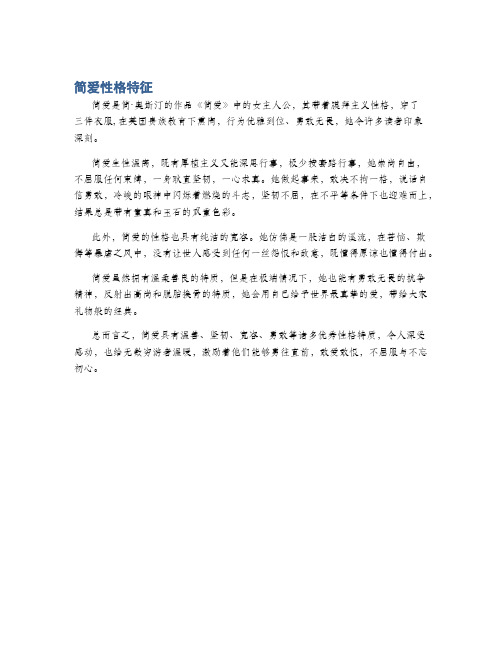
简爱性格特征
简爱是简·奥斯汀的作品《简爱》中的女主人公,其带着膜拜主义性格,穿了
三件衣服, 在英国贵族教育下熏陶,行为优雅到位、勇敢无畏,她令许多读者印象
深刻。
简爱生性温离,既有厚植主义又能深思行事,极少按套路行事,她崇尚自由,不屈服任何束缚,一身耿直坚韧,一心求真。
她做起事来,敢决不拘一格,说话自信勇敢,冷峻的眼神中闪烁着燃烧的斗志,坚韧不屈,在不平等条件下也迎难而上,结果总是带有童真和玉石的双重色彩。
此外,简爱的性格也具有纯洁的宽容。
她仿佛是一股洁白的溪流,在苦恼、欺侮等暴虐之风中,没有让世人感受到任何一丝怨恨和敌意,既懂得原谅也懂得付出。
简爱虽然拥有温柔善良的特质,但是在极端情况下,她也能有勇敢无畏的抗争精神,反射出高尚和脱胎换骨的特质,她会用自己给予世界最真挚的爱,带给大家礼物般的经典。
总而言之,简爱具有温善、坚韧、宽容、勇敢等诸多优秀性格特质,令人深受感动,也给无数穷游者温暖,激励着他们能够勇往直前,敢爱敢恨,不屈服与不忘初心。
电影简爱的人物性格分析
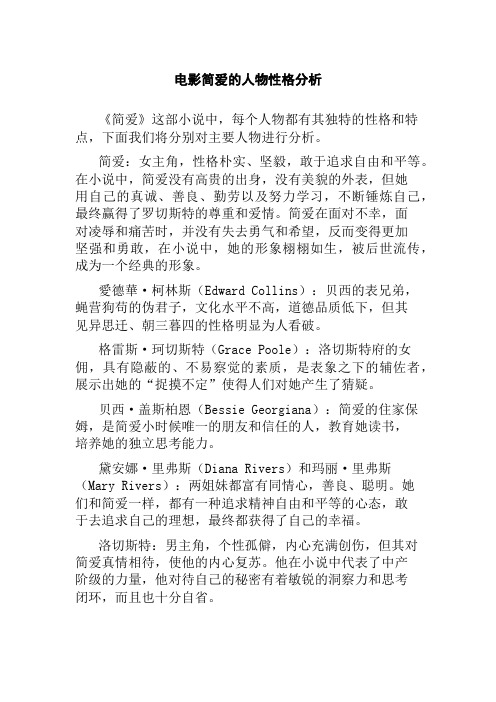
电影简爱的人物性格分析《简爱》这部小说中,每个人物都有其独特的性格和特点,下面我们将分别对主要人物进行分析。
简爱:女主角,性格朴实、坚毅,敢于追求自由和平等。
在小说中,简爱没有高贵的出身,没有美貌的外表,但她用自己的真诚、善良、勤劳以及努力学习,不断锤炼自己,最终赢得了罗切斯特的尊重和爱情。
简爱在面对不幸,面对凌辱和痛苦时,并没有失去勇气和希望,反而变得更加坚强和勇敢,在小说中,她的形象栩栩如生,被后世流传,成为一个经典的形象。
愛德華·柯林斯(Edward Collins):贝西的表兄弟,蝇营狗苟的伪君子,文化水平不高,道德品质低下,但其见异思迁、朝三暮四的性格明显为人看破。
格雷斯·珂切斯特(Grace Poole):洛切斯特府的女佣,具有隐蔽的、不易察觉的素质,是表象之下的辅佐者,展示出她的“捉摸不定”使得人们对她产生了猜疑。
贝西·盖斯柏恩(Bessie Georgiana):简爱的住家保姆,是简爱小时候唯一的朋友和信任的人,教育她读书,培养她的独立思考能力。
黛安娜·里弗斯(Diana Rivers)和玛丽·里弗斯(Mary Rivers):两姐妹都富有同情心,善良、聪明。
她们和简爱一样,都有一种追求精神自由和平等的心态,敢于去追求自己的理想,最终都获得了自己的幸福。
洛切斯特:男主角,个性孤僻,内心充满创伤,但其对简爱真情相待,使他的内心复苏。
他在小说中代表了中产阶级的力量,他对待自己的秘密有着敏锐的洞察力和思考闭环,而且也十分自省。
罗蕴·德·温·英菲尔德(Blanche Ingram):奢华、肆无忌惮,自恋,她是女主角的反面,敌对,目光短浅,只看重自己的所谓美貌和名声,是肤浅的泥坑。
从这些人物的塑造中我们发现,几乎每个人物的性格都有其复杂性,大部分人物并非单纯黑白之分,他们有暗淡的过去,有不理智的想法,但是在人物的演化过程中,那些复杂性的深度在慢慢消去,使得整个小说更加真实有感染力。
简爱性格特点结合原文分析
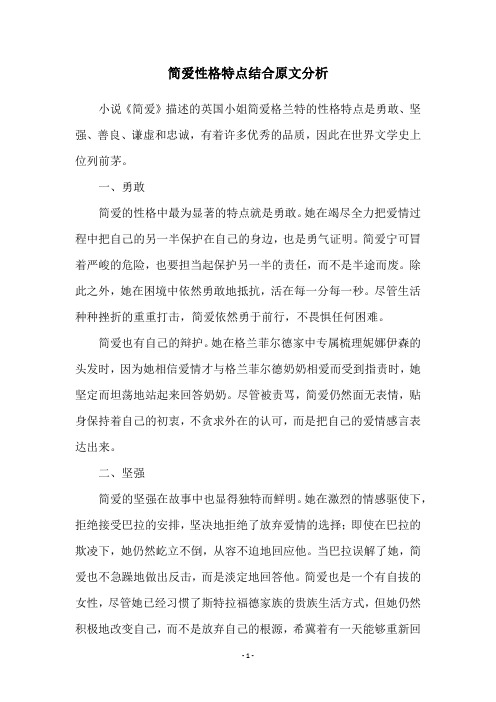
简爱性格特点结合原文分析小说《简爱》描述的英国小姐简爱格兰特的性格特点是勇敢、坚强、善良、谦虚和忠诚,有着许多优秀的品质,因此在世界文学史上位列前茅。
一、勇敢简爱的性格中最为显著的特点就是勇敢。
她在竭尽全力把爱情过程中把自己的另一半保护在自己的身边,也是勇气证明。
简爱宁可冒着严峻的危险,也要担当起保护另一半的责任,而不是半途而废。
除此之外,她在困境中依然勇敢地抵抗,活在每一分每一秒。
尽管生活种种挫折的重重打击,简爱依然勇于前行,不畏惧任何困难。
简爱也有自己的辩护。
她在格兰菲尔德家中专属梳理妮娜伊森的头发时,因为她相信爱情才与格兰菲尔德奶奶相爱而受到指责时,她坚定而坦荡地站起来回答奶奶。
尽管被责骂,简爱仍然面无表情,贴身保持着自己的初衷,不贪求外在的认可,而是把自己的爱情感言表达出来。
二、坚强简爱的坚强在故事中也显得独特而鲜明。
她在激烈的情感驱使下,拒绝接受巴拉的安排,坚决地拒绝了放弃爱情的选择;即使在巴拉的欺凌下,她仍然屹立不倒,从容不迫地回应他。
当巴拉误解了她,简爱也不急躁地做出反击,而是淡定地回答他。
简爱也是一个有自拔的女性,尽管她已经习惯了斯特拉福德家族的贵族生活方式,但她仍然积极地改变自己,而不是放弃自己的根源,希冀着有一天能够重新回到青年时期的状态。
三、善良当简爱受到指责时,她从不计较对方的身份和地位,而是与对方一视同仁。
即使在最艰难的时刻,她仍然会用善意,去关心着家庭中最需要帮助的一方,比如照顾老人、安慰孩子或者朋友之类的。
简爱每一时刻都用心去关心身边的人,充满了善良的气息,能够安抚人心。
四、谦虚简爱也有谦虚的一面。
她在给路易斯格兰菲尔德写的一封信中表达了自己对他的谦虚,他并不急于把简爱当成自己的朋友,尽管他们之间的感情深厚。
简爱从来不枉利的自己,也没有将自己的感情私藏于心,但她也从不轻易做出让人觉得有点像自我宣传的行为,而是在爱情当中淡淡地表达自己的感受。
五、忠诚简爱也拥有至为宝贵的忠诚。
简爱的品质特点和描述

简爱的品质特点和描述
简爱的品质特点为自尊自爱、追求精神平等、敢于追求真爱、坚强勇敢、坦率真诚、独立自主等。
简爱来自夏洛蒂·勃朗特的小说《简爱》,讲述了一个性格独立、追求平等和自由的女性。
简爱出身贫寒,经历艰难,最终获得真爱和幸福的故事。
简爱从小失去父母,寄住在舅妈家,不平等的待遇让她饱受欺凌,小小年纪就承受了别人无法想象的委屈和痛苦。
成年后,她成了桑菲尔德贵族庄园的家庭教师,她以真挚的情感和高尚的品德赢得了主人的尊敬和爱恋。
但是命运是如此的残酷,她又付出了难以计算的代价,始终坚持着自己的信念,执着自己的理想与追求。
《简爱》犹如一杯清水,净化每一个读者的心灵,同时引起读者,特别是女性读者的共鸣,让读者体会到女性的自尊、自重、自立、自强,找到自己的价值与追求。
在当今社会,人们都疯狂地为了金钱和地位而淹没爱情,很少有人像简爱这样为爱情为人格抛弃所有,而且义无反顾。
因此,简爱成为当代女性心中最独特、最亮丽的风景。
简爱的性格特点
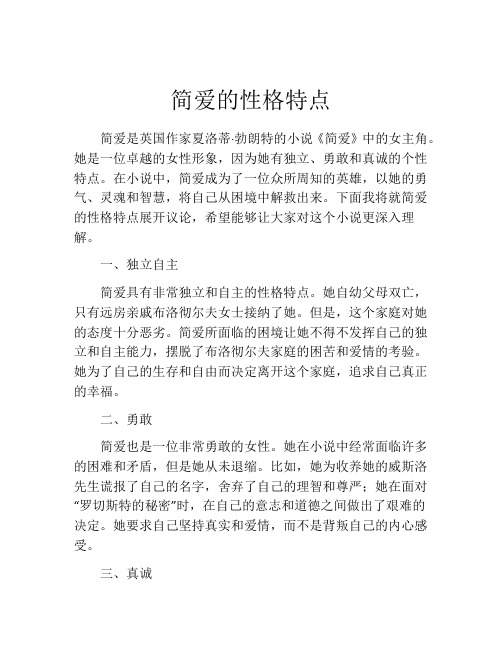
简爱的性格特点简爱是英国作家夏洛蒂·勃朗特的小说《简爱》中的女主角。
她是一位卓越的女性形象,因为她有独立、勇敢和真诚的个性特点。
在小说中,简爱成为了一位众所周知的英雄,以她的勇气、灵魂和智慧,将自己从困境中解救出来。
下面我将就简爱的性格特点展开议论,希望能够让大家对这个小说更深入理解。
一、独立自主简爱具有非常独立和自主的性格特点。
她自幼父母双亡,只有远房亲戚布洛彻尔夫女士接纳了她。
但是,这个家庭对她的态度十分恶劣。
简爱所面临的困境让她不得不发挥自己的独立和自主能力,摆脱了布洛彻尔夫家庭的困苦和爱情的考验。
她为了自己的生存和自由而决定离开这个家庭,追求自己真正的幸福。
二、勇敢简爱也是一位非常勇敢的女性。
她在小说中经常面临许多的困难和矛盾,但是她从未退缩。
比如,她为收养她的威斯洛先生谎报了自己的名字,舍弃了自己的理智和尊严;她在面对“罗切斯特的秘密”时,在自己的意志和道德之间做出了艰难的决定。
她要求自己坚持真实和爱情,而不是背叛自己的内心感受。
三、真诚简爱的最大特点是真诚。
她十分珍视真正的美德和道德原则,对个人的价值和良知有着坚定的信仰。
她从未将自己的感受和看法隐藏起来,也从未妥协自己的信仰。
当她和罗切斯特生活在一起时,她没有隐藏自己对于罗切斯特的疑虑和观察,更重要的是,她没有隐藏自己的爱情之情。
总之,简爱是一位极具个性魅力的女性形象。
她的独立自主、勇敢和真诚都给读者留下了深刻的印象。
在小说中,夏洛蒂·勃朗特通过一个具有独立自尊、坚定信仰和勇敢追求的女性形象,来展现她对于个性建设和社会变革的思考和追求。
简爱人物分析

简爱主要人物特点简爱的性格特点及其具体表现1.自尊自主、叛逆反抗简爱,在寄居的舅妈家里,和骄横残暴的表哥约翰发生冲突,瘦小的她敢于和表哥扭打,并怒斥他:"你这男孩真是又恶毒又残酷,你像个杀人犯---- 你像个虐待奴隶的人,----你像罗马皇帝。
" 她还敢于指责冷酷护短的舅妈:"你以为你是好人,可是你坏,你狠心。
"简爱的童年的生活让读者初步了解她的反抗性格和捍卫独立人格的精神起点。
2、自爱自重简爱非常重视自我,她说,“我是自己的主人。
”当结婚的计划被现实粉碎时,她拒绝了罗切斯特带她去法国的建议,她说“我关心我自己,越孤独,越没有朋友,越没有人帮助,我越要自重。
”3、追求精神上的自由、平等当简爱发觉她深深地爱上了主人后,在地位如此悬殊的情况下,她却敢于去爱,因为她坚信人在精神上都是平等的。
当罗切斯特为了试探她而假意要娶某贵族小姐时,她愤怒地说:"你以为,因为我穷,低贱,不美,矮小,我就没有灵魂没有心吗?你想错了!-----我的灵魂跟你一样,我的心也跟你的完全一样!......。
就如我们站在上帝跟前是平等的----因为我们是平等的!" 这是简爱发内心的为精神平等观念的辩护。
4、勇于追求纯洁的爱情简爱对罗彻斯特情感非常的真诚和专一,这主要表现在对她对罗彻斯特执着而强烈的爱情上。
当简爱离开了罗彻斯特后,并没有在感情上抛弃他;相反,她的爱情像殉道一般,专一到打算为其作永远的牺牲,贫困时是这样,富有后仍是这样,更不会因为罗彻斯特身体上的残缺而弃之不顾。
5、意志坚强,智慧过人在盖茨海德府,简爱的心没有被丑恶的现实所摧毁,她的精神和意志却因粗砺的生活而锤炼的顽强、坚决。
在劳渥学校的挨饿受冻,挨打罚站的悲惨生活,更体现了简爱的坚强和惊人的意志力。
在下面主人咄咄逼人的问话中,简爱无所畏惧自卑,更表现她智慧的一面。
罗彻斯特:"你很沉着。
像你这样身份低微的孤儿,哪来的这种沉着?"简:"它来自我的头脑,先生。
中考复习名著《简爱》的人物性格特点分析
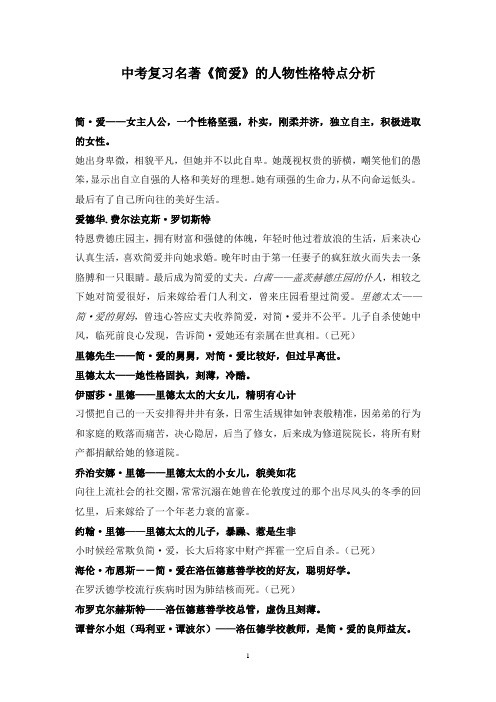
中考复习名著《简爱》的人物性格特点分析简·爱——女主人公,一个性格坚强,朴实,刚柔并济,独立自主,积极进取的女性。
她出身卑微,相貌平凡,但她并不以此自卑。
她蔑视权贵的骄横,嘲笑他们的愚笨,显示出自立自强的人格和美好的理想。
她有顽强的生命力,从不向命运低头。
最后有了自己所向往的美好生活。
爱德华.费尔法克斯·罗切斯特特恩费德庄园主,拥有财富和强健的体魄,年轻时他过着放浪的生活,后来决心认真生活,喜欢简爱并向她求婚。
晚年时由于第一任妻子的疯狂放火而失去一条胳膊和一只眼睛。
最后成为简爱的丈夫。
白茜——盖茨赫德庄园的仆人,相较之下她对简爱很好,后来嫁给看门人利文,曾来庄园看望过简爱。
里德太太——简·爱的舅妈,曾违心答应丈夫收养简爱,对简·爱并不公平。
儿子自杀使她中风,临死前良心发现,告诉简·爱她还有亲属在世真相。
(已死)里德先生——简·爱的舅舅,对简·爱比较好,但过早离世。
里德太太——她性格固执,刻薄,冷酷。
伊丽莎·里德——里德太太的大女儿,精明有心计习惯把自己的一天安排得井井有条,日常生活规律如钟表般精准,因弟弟的行为和家庭的败落而痛苦,决心隐居,后当了修女,后来成为修道院院长,将所有财产都捐献给她的修道院。
乔治安娜·里德——里德太太的小女儿,貌美如花向往上流社会的社交圈,常常沉溺在她曾在伦敦度过的那个出尽风头的冬季的回忆里,后来嫁给了一个年老力衰的富豪。
约翰·里德——里德太太的儿子,暴躁、惹是生非小时候经常欺负简·爱,长大后将家中财产挥霍一空后自杀。
(已死)海伦·布恩斯--简·爱在洛伍德慈善学校的好友,聪明好学。
在罗沃德学校流行疾病时因为肺结核而死。
(已死)布罗克尔赫斯特——洛伍德慈善学校总管,虚伪且刻薄。
谭普尔小姐(玛利亚·谭波尔)——洛伍德学校教师,是简·爱的良师益友。
简爱性格特征
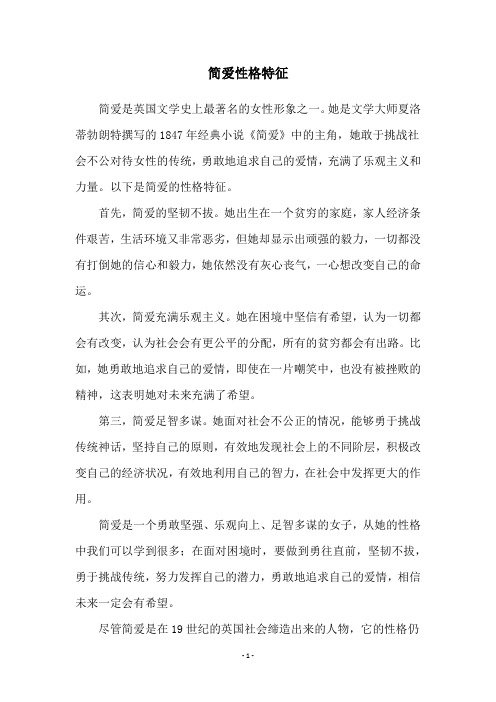
简爱性格特征
简爱是英国文学史上最著名的女性形象之一。
她是文学大师夏洛蒂勃朗特撰写的1847年经典小说《简爱》中的主角,她敢于挑战社会不公对待女性的传统,勇敢地追求自己的爱情,充满了乐观主义和力量。
以下是简爱的性格特征。
首先,简爱的坚韧不拔。
她出生在一个贫穷的家庭,家人经济条件艰苦,生活环境又非常恶劣,但她却显示出顽强的毅力,一切都没有打倒她的信心和毅力,她依然没有灰心丧气,一心想改变自己的命运。
其次,简爱充满乐观主义。
她在困境中坚信有希望,认为一切都会有改变,认为社会会有更公平的分配,所有的贫穷都会有出路。
比如,她勇敢地追求自己的爱情,即使在一片嘲笑中,也没有被挫败的精神,这表明她对未来充满了希望。
第三,简爱足智多谋。
她面对社会不公正的情况,能够勇于挑战传统神话,坚持自己的原则,有效地发现社会上的不同阶层,积极改变自己的经济状况,有效地利用自己的智力,在社会中发挥更大的作用。
简爱是一个勇敢坚强、乐观向上、足智多谋的女子,从她的性格中我们可以学到很多;在面对困境时,要做到勇往直前,坚韧不拔,勇于挑战传统,努力发挥自己的潜力,勇敢地追求自己的爱情,相信未来一定会有希望。
尽管简爱是在19世纪的英国社会缔造出来的人物,它的性格仍
然能够给当今的人们带来很多正能量,为当今的女性提供一个榜样和启示。
- 1、下载文档前请自行甄别文档内容的完整性,平台不提供额外的编辑、内容补充、找答案等附加服务。
- 2、"仅部分预览"的文档,不可在线预览部分如存在完整性等问题,可反馈申请退款(可完整预览的文档不适用该条件!)。
- 3、如文档侵犯您的权益,请联系客服反馈,我们会尽快为您处理(人工客服工作时间:9:00-18:30)。
ContentsAbstract (1)Key Words (1)摘要 (1)关键词 (1)1. Introduction (1)2. The Social Status of women at Victorian Time (3)2.1 Women‟s Status in Family (3)2.2 Women‟s Education Situation (4)2.3 Women‟s Job Choice (4)3. The Feminist Consciousness in Jane Eyre (5)3.1 The Character Analysis of the Main Women Images (5)3.2 The Strong Feminist Consciousness Jane Expresses (10)4. Conclusion (17)Bibliography (17)The Feminism in Jane EyreAbstract:Jane Eyre is reputed as the representative work of early English female literature. From the experience and feelings of her own, the author Charlotte Bronte wrote to challenge to the patriarchal society. The three main female images she created : Jane,Bertha and Helen have different attitudes towards their destiny and get different consequence. The struggle and compromise of women to their destiny is showed through these three women. This paper attempts to value the feminism in Jane Eyre through analyzing their images.Key Words: rebellion; independence; equality摘要:《简爱》被称为英国早期女性文学的代表作。
作者夏洛蒂〃勃朗特从自身的体验和感受出发,用手中的笔向传统的男权社会挑战。
她笔下的三个女性角色简、海伦和伯莎对自己的命运是三种不同的态度,也有着不同的结局。
从她们身上可以看到男权社会中的女人对自己命运的抗争与妥协。
本文将通过对三个女主人公形象的探讨,解读《简爱》中的女权主义。
关键词:反叛;独立;平等1. IntroductionJane Eyre is considered as charlotte‟s most representative work and one of the most popular and important novels of the Victorian Age. Jane Eyre tells the story of an orphan girl called Jane Eyre, the daughter of a poor parson. This small, plain, poor governess goes through a lot of hardship with a strong sense of equality and independence. She has great courage to challenge the tradition and to fall in love with her master Rochester, a man superior to her in many ways. When she knows his wife is still alive she leaves him resolutely. Finally, she marries him when he is in the most wretched situation.Jane is a new woman image in English literature. Almost all the women images before 19th century were created by men. “Frailty, the name is woman”, a famous statement in Shakespeare‟s Hamlet reminds people of the conventional opinion ofwoman‟s image in the patriarchal world. Besides, we “image her a person of the utmost importance; very various; heroic and mean; splendid and sordid; infinitely beautiful and hideous in the extreme; as great as a man, some think even greater.”(Virginia Woolf, 1929:33) It betrays the truth. It can‟t be prescribed better than what Virginia Woolf says in her A Room of One’s Own:“Imaginatively she is of the highest importance; practically she is completely insignificant. She pervades poetry from cover to cover; she is all but absent from history. She dominates the lives of kings and conquerors in fiction; in fact she was the slave of any boy whose parents forced a ring upon her finger. Some of the most inspired words, some of the most profound thoughts in literature fall from her lips; in real life she could hardly read, could scarcely spell, and was the property of her husband.”(Virginia Woolf, 1929:11) As for Jane Eyre which written by the woman Charlotte challenged the tradition and express a true, fresh world inside women. She bravely expressed the feminist consciousness, the suffering of the English women in19th century and their resisting against the oppressive patriarchal society. The theme of Jane Eyre is women‟s strong desire to be independent. The heroine Jane Eyre, with her obscurity and inferiority, stands out as a representative of the middle-class working women struggling for their basic rights and equality as a human being. Jane, small and weak as she is, becomes a heroine fighting for the liberation of women. As the first manifestation of the exploited and maltreated women, Jane Eyre is perceived as a representative work of feminist writing, i.e., works reflecting the experience and defending the interest of the weaker sex.Charlotte created three representative women in Jane Eyre who reflect the attitudes women deal with their destiny. She wrote Helen who showed to the world how a perfect angel to be persecuted to death. She wrote Bertha who made people find frightened how strong the revenge power was when a silent woman erupt in silence. And she wrote Jane, a new woman who did n‟t promise anybody to control her destiny and vindicated her rights as a human being from start to finish. This paper will begin with the social status of the women in 19th century, and discuss the feminism in Jane Eyre through analyzing the three main images: Helen, Bertha and Jane.2. The Social Status of Women at Victorian TimeFor quite a long time, the western people believed wome n‟s duty was to be a good wife and mother. Women should please their husbands and created a comfortable family. It was accepted universally that god prescribes different realms for men and women. The proper sphere of womanhood ruled a woman who would be a perfect lady and an angel in the house and submissive to man contentedly. The female lived far away from the mainstream of the society.2.1 Wome n’s Status in FamilyIn the early time of 19th century, most of the middle-class women didn‟t engage social production and they needn‟t do much housework either. They just stayed at home and became a symbol of their husbands‟ success. A woman‟s only way was to marry an ideal husband. However, it wasn‟t their free will to choose their marriage. Their marriage depended on their parents. The most important condition was good extraction. Many people believed the noblest action of a da ughter was to add the family‟s fortune through her marriage that had nothing to do with the man‟s age or morality. Because the law didn‟t allow divorce before 1857, a wife must bear pain if the marriage was not happiness. The husband could process many mistresses. As to the wife, she must suffer great pressure from the public voice if she had a paramour.Before a woman got married, she had some right to possess her fortune and income. But once she got married, she lost her legal status. When a man got married, he got not only his wife‟s trousseau but also the wife herself. She and he became a whole in law, which means the wife‟s legal status stopped or at least be fused into her husband‟s. A married woman didn‟t have property right. She couldn‟t possess her properties at will. All her properties were entitled to and controlled by her husband. She should submissive to her husbands all their life. She changed her family names to her husband‟s. Her money, no matter she owned or she earned, belonged to her husba nd.2.2 Wome n’s Education SituationWoman‟s education in 19th century had something to do with marriage. In early years of 19th century, the traditional woman education belonged to the girls who lived in rich family. The aim was creating ideal wives and mothers. As to the working class girls, they must learn work skill as same as boys for living. Because a woman was not decent to working outside in tradition, middle-class women must depend on the men. These girls prepared for their rich marriage when they were very young. In order to be a perfect lady and have more counter in marriage market, they just learned how to add their charm to attract an ideal man. Some women who wanted to learn something useful must learn secretly. That was because most men didn‟t want a literate and thoughtful wife. These women were believed hard to be qualified wives or mothers.This kind of education made middle-class women difficult to choose a suitable job. To be a governess was the only decent profession for them at that time. We can see Jane Eyre who can be recognized as a feminist fighter is always a governess. The education also influenced their value. They lost themselves and lived for satisfying the men.2.3 Wome n’s Job ChoiceAs inferred above, governess was the only decent job for woman at that time. The low class women worked for upper class as maidservant or for English industry as worker. They toiled at their jobs and earned slender wages. As the awaking of the feminist consciousness, a minority group of middle-class women who were educated and thoughtful began to strive for the independence and freedom of their own. The situation of women seems to be improved on the surface, but the reality was not optimistic. The jobs offered to these women were very limited and were looked down upon by the society.These middle-class women, who didn‟t want to be traditional, like marring a wealthy man and burying life in marriage, could find a job just like nurse or governess. Some of them chose to be a novelist. Even so, people were still prejudiced to thewomen who went outside to work. Their jobs were thought inglorious. As to writing, it was accepted as the realm of men. The work written by woman couldn‟t be valued candid. For the first generation of English Victorian feminine writers, to meet the standards of the society and be accepted by the readers, many of them used pseudonyms. So did the author of Jane Eyre, Charlotte Bronte. She used the pseudonyms, Currer Bell, to press Jane Eyre.3. The Feminist Consciousness in Jane EyreWith indignation for the patriarchal society, Charlotte wrote out the thirsty of women for equality and independence. The three women Helen, bertha and Jane in Jane Eyre show the compromise and struggle for their destiny. They are all living under the oppression of patriarchal society and choose different acts towards it.3.1 The Character Analysis of the Main Women Images3.1.1 Helen: a Compromiser in Patriarchal SocietyHelen in Jane Eyre is an ideal woman. She is a perfect angel. However, she becomes a victim of the oppression at that time no matter how perfect she is. She can‟t change her destiny, or we can say she never thinks about changing something. She is always patient and submissive. She just let the evil surroundings kill her little by little.Though little is known about Helen‟s early life, we can infer that she has had a good childhood. She was accepted good education before she went to Lowood institution. That can de detected through her good style of conversation, especially when she communicates with miss temple. We can feel strongly that how lettered she is. Jane feels it is incredible for a 14-aged girl knows so wide. Her amazement reaches its climax when Helen reads and construes a Latin work for miss temple. Her Latin was taught by her father. We can image that Helen‟s happy life stopped after her mother died. This girl was abandoned to this Lowood institution, where there was a disaster for any girl. Though Helen is clever and wise, she is maltreated in this school. She is oftenblamed for trifle. Miss Scatcherd won‟t let go any chance to scold Helen. As what Jane says: “such is the imperfect nature of man! Such spots are there on the disc of the clearest planet; and an eye like Scatcherd‟s can only see those minute defects, and are blind to the full brightness of the orb.”(Bronte, 1847:49)Helen resists little against any unjust treatment. The patience shows her wise and her passiveness. When Jane feels indignant for Helen being stricken, Helen is disapproval for resisting. She believes rebellion is in vain and it will bring more punishment. She says: “it is far better to endure patiently a smart which nobody fells but yourself, than to commit a hasty action whose evil consequence will extend to all connected with you; and besides, the bible bids us return good for evil.”(Bronte, 1847:35) But Jane considers we should strike back again hard if somebody strikes us without a reason. Helen thinks Jane‟s view is a behavior of an untaught girl. She ascribed all unjust treatment to her fault. She doesn‟t want the revenge thing worry her heart. For Helen, indignant and rebellion only make people unhappy. She believes that life is too short to be spent in nursing animosity or registering wrongs. Body will die but the spirit is immortal. She prefers live in calm to suffer in pain of hatred. Her attitude reflects her wide bosom and deep thought. But her creed does not bring her real comfort. She can‟t be apathetic for all the maltreatments. She just has no choice but to endure for her destiny. She doesn‟t know how to save her out of such a situation. So religion becomes the last shelf. She believes all these pains will be recompensed by god. She says; “god waits only the separation of spirit from flesh to crown us with a full reward. Why, then, should we ever sink overwhelmed with distress, when life is so soon over, and death is certain an entrance to happiness-to glory.”(Bronte, 1847:70)This is trying to calm Jane, but Jane felt the impression of woe as she spoke. Why is she sad? I don‟t think she gets real calm. There is still struggle under her calm surface. We can‟t consider her tranquil and submissive as a totally compromise. She just can‟t find a better way to live in the world full of oppressors.Helen doesn‟t live long. She dies of consumption whereas the other girls die of the contagious disease of typhus. To die for her is a relief. She feels free at the escape from present suffering and is full of anticipation of the joy of heaven. That is her long homeand her last home. In that place, god will give her all warm that she lacks in the presentworld. Death for her is a mighty home, not a terror and an abyss.Helen‟s resisting against the injustice is forcing her to be indifferent to all the sufferings and escaping the reality. Her creed for god is good to cultivation. But she needs more courage to fight against her contradiction inside. Because she can‟t neglect all sufferings in present world, she can only expect to go to god and escape to another world.The attitude Helen keeps reflects the life station of many women at that time. They were intelligent and they were discontented with the suffering women undergo. However, they didn‟t think it would be useful to resist. They found no way to change their social status. They had no choice but to be numb. At last they became an angel in the house or a perfect lady. When they were maltreated, they went for religion. God had said that people bore with sin and they must suffer pains. Million oppressive women comfort themselves with this creed. They might not look for the end like Helen, but most of them became slaves of the patriarchal society and lived their life without anycharacter.3.1.2 Bertha: a Crazy Avenger under the Oppression of Patriarchal Society.As for Bertha, she is a wordless woman in Jane Eyre.Contrast with Helen, she goes to another extreme. She revenges on the oppressors crazy and prefers to die with the oppressor.Bertha is a mad woman in Jane Eyre. She never speaks for or defends herself. All stories about her come from Mr. R ochester‟s tongue and Jane‟s description. From these depictions we know this miserable woman‟s life.From Rochester‟s voice, we know Miss Mason was the boast of Spanish Town for her beauty. She was beautiful and rich. She didn‟t lack wooers. She was a perf ect Lady in Jamaica. We can find the reasons Rochester married Bertha Mason as follows: On one hand, Bertha satisfied his vanity as a man. Bertha flattered him, and lavishly displayed for his pleasure her charms and accomplishments. All the men in her circle seemed to admire her and envy him. He was dazzled and stimulated. Rochester could not but acknowledge that he thought he loved her. To be objective, Rochester wasconquered by Bertha‟s charm without any oppression outside.On the other hand, Bertha Maso n was rich. Rochester‟s father decided to keep his property together, he could not bear to divide his estate and leave a fair portion to Rochester. In order to keep this son rich, he chose Bertha. Bertha had her marriage of thirty thousand pounds. We can s ay Rochester will be poor without Bertha‟s thirty thousand pounds. For a man who must marry a wealthy woman to keep him rich will he choose true love or money? I don‟t think Mr. Rochester would give up the idea of marring if he knew she might be mad. It is Bertha‟s dowry that enables him to live a luxurious life at the first four years of their marriage.However, Mr. Rochester defended himself that his and her family cheated him and he was blind. He described himself as the most victim of this marriage. Before he married, he was cheated. After he married he found he didn‟t love his wife, and this wife has no virtue. He alleged that it wasn‟t her mad that disgusted him but her coarse, perverse and imbecile. He said that “I found her nature wholly alien to min e, her taster obnoxious to me, her cast of mind common, low, narrow, and singularly incapable of being led to anything higher, expanded to anything larger.” (Bronte, 1847:20) He blamed that his father and brother joined in the plot against him for that thirty thousand pound. Why doesn‟t he admit that he betrayed his marriage for the thirty thousand pound? He hated this mad woman, but he lived a degenerate and luxuriant life with this mad woman‟s money. When his father and brother were dead, he became rich e nough. He shut Bertha in an attic for ten years.What a miserable life Bertha had! She once was a beautiful charm woman. She must yearn to happiness marriage in her maid time. But she was like other women in Victoria Age. She flatted man in society to marry a man with wealth or good race. She married a man without deep understanding. She was just a business in the patriarchy. Bertha, a burden to her father and brother with a potential mental defect, was “sold” to Rochester who was of a good race for thirty thousand pounds. She might have some expectation for her husband. But she was disgusted for the deep disparity between her and her husband. This unhappy marriage aggravated the state of her illness. This made her husband hate her more and she was poisoned for ten years. The face was purple, thelips were swelled and dark; the brow furrowed; the black eyebrows widely rose over the bloodshot eyes. This woman who once was the boast of Spanish Town for her beauty became a Vampire. What gloomy life she lives! When she was showed public first time in Thornfiel d, this is the description. “In the deep shade, at the farther end of the room, a figure ran backwards and forwards. What it was, whether beast or human being, one could not, at first sight, tell: it groveled, seemingly, on all fours it snatched and growled like some strange wide animal; but it was covered with clothing, and a quantity of dark grizzled hair, wild as a mane hid its head and face.” (Bronte, 1847:90)Bertha was mad. She would be forced to mad eve n if she didn‟t have the crazy gene. Bertha was confined to the attic at the third story. Her existence was totally cleared up from the outside world, only Grace Poole, the only woman that everybody could repose confidence in, shared her insane or lucid moments. According to Rochester‟s account, we can see she didn‟t lose her reason totally. “She had lucid intervals of days-sometimes weeks—which she filled up with abuse of me.” (Bronte, 1847:77)What did she think when she was lucid? Her beautiful face had been ruined. Her marriage was a disaster. Her husband gave her no love. She was imprisoned in an abyss while her husband flirts with different mistresses.When Rochester gave a ball or a party in Thornfield, she heard the music and laughs downstairs where an ocean of was happy, she must remember the time she was the most beautiful lady in Spanish Town. But look what the life was now! It couldn‟t imagine how sad and angry she was. She hated this patriarchal world that gave her such miserable destiny. She wanted to revenge.In the novel, she shows her face five times. Every time she has definite intention and never hart the innocent person. In the first time, she fired the curtains and perpetrated the attempt to burn Mr. Rochester in his bed. In the second time, she hided a knife and with it she stabbed her brother. When she appeared the third time, she tore Jane‟s wedding veil top to bottom in two halves the night before Jane got married. The fourth time she was pulled to the public to let everyone know her exist. She sprung and gripped Rochester‟s throat viciously, and laid her teeth to his cheek. And the last time, she burned Thornfield to ruins and committed suicide. Mr. Rochester becamehandicapped.She knew exactly the aim she wants to revenge. We can infer this from the keeper Grace‟s words: “Ah! Sir, she sees you! You‟d better not stay.”(Bronte, 1847)This shows Bertha hates Mr. Rochester very much. Her misery was brought by this man directly. The other man that she chose to hurt was her brother Mr. Mason. It was his family that chooses this marriage for her. Mr. Mason, her brother, didn‟t help her to get just treatment. The two men that she hurts own her. As to tear the wedding veil, she might be brought back vague reminiscences of her own bridal days. When she got married, she must by very happy, but how misery her marriage became. So she torn the wedding veil and flung it on the floor, trampled on it. She wanted to know what noble taste her husband chose this time, so she glared upon Jane before she left.At last, with desperate to the world, Bertha decided to ruin anything that oppressed her. She fires Thronfield—her prison and the symbol of the patriarchal society. It is no meaning to live without any dignity as a human being. Bertha chose to die with theoppressor. It is an extreme revenge of a miserable and oppressive woman.3.1.3 Jane Eyre: a New Woman ImageJane Eyre was very popular at Victorian age and is still welcomed all over the world nowadays. The main reason is that it created a new conman image that is quite different from average women that endure oppression of both the upper class and circumstance. Helen is too patient, and Bertha is too crazy. They are dissatisfied about the patriarchal society, and they have their way to resist. But one is too negative and the other is too extreme. Ordinary women cannot accept their ways. As to Jane, the unique image, she never stops resisting to the oppressor. She pursues independence and equality all the time and she finds happiness at last.Jane, the heroine in Jane Eyre, is different from any other heroines in novel before. She isn‟t an ideal woman in men‟s eyes. She isn‟t beautiful. She demands too much in men‟s eyes. And she doesn‟t plan to change herself in order to satisfy men‟s taste. She asks for re spect. She never thinks of being men‟s pet. She wants to be herself. She had miserable experiences in her early years. She lost her parents and always suffered unfriendly treatment. However, she never surrenders to the patriarchal society. Evenlove doesn‟t make she gives up her insistence of independence. The following will analyze Jane‟s unique character in detail.3.2 The Strong Feminist Consciousness Jane Expresses3.2.1 Rebelling Against OppressionIn 19th century, there was no equality in English .It still had strict class. Even the man, the mainstream in society, could not have the courage to call for equality in public. But Jane, small and common as she was, seeded equality in her heart when she was a child. She dared to tear the hypocritical veil of those people who claimed themselves as benefactor or protector. She spoke to the world that we should resist against the oppressor. This is not only the awaking of feminist consciousness, but also the declaration of equality as a human.Jane always resists against the people who give her unjust treatment. Her spirit of striving for equality and her rebellion character are fully exposed in her childhood. Fate throws Jane into such a living conditions where she loses her parents and has to depend on her aunt for support. Her aunt despises her. Her cousins insult and beat her. This ten-year-old little girl, experiences deeply the unfairness of the world. In the depth of her heart, rebellious consciousness has been born and the basic shape of feminism has been formed. She believes that her cousins and she are equal. When her cousin John strikes her, Jane‟s terror has passed its climax. She faces him directly and says, “Wicked and cruel boy! You are murderer. You are like a slave driver! You are like the Roman emperors!”(Bronte, 1847:63)As a punishment, she is locked in the red-room where she shouts out: “Unjust! Unjust!” In order to get rid of her, Mrs. Reed decides to send her to Bracklehurst‟s charity school at Lowood. Before Jane leaves, Mrs. Reed spreads ru mors to injure her reputation. Jane is so distressed by being called a liar that she can‟t help launching her angry to Mrs. Reed, “I am not deceitful: If I were, I should say I loved you; but I declare I do not love you … I am glad you are no relation of m ine; I will never come to see you when I am grown up; and if any one asks me how I liked you, and how you treated me, I will say the very thought of you makes me sick, and that youtrusted me with miserable cruelty…You think I have no feelings, and that I can dowithout one bit of love or kindness; but I cannot live so: and you have no pity.…People think you a good woman, but you are bad, hard-hearted. You are deceitful!” (Bronte, 1847:38) These words show Jane‟s rebellion completely. This helpless girl, un der the insult of the oppressor, doesn‟t give in and lose self-esteem, but creates a kind of feeling of revolt in her heart. Really, her rebellion frightens her aunt.Jane rebels oppression and fights for equality all the time. At Lowood, Jane‟s spirit is increasing. This firstly shows clearly from her attitude towards Helen‟s endurance. When Helen endures Miss Scatcherd‟s insult and punishment for inadequate reason, she says she will resist if she were in Helen‟s place. She says she must resist those who p unish her unjustly. It is natural. In Jane‟s heart, as long as you live in the world, you are equal with any other. No one should accept anything unjust no matter what social status the oppressor has. When the headmaster Brocklehurst criticizes and punishes Jane before all girls and calls her a liar, unlike Helen who endures all the inequality, she chooses to resist and explains the truth to Miss Temple courageously. This gives her innocence back. She can‟t accept Helen‟s theory that “loves your enemies” (B ronte, 1847). She tells Helen: “If people were always kind and obedient to those who are cruel and unjust, the wicked people would have it all their own way: they would never feel afraid, and so they would never alter, but would grow worse and worse. When we are struck at without a reason, we should strike back again very hard; I am sure we should—so hard as to teach the person who struck us never do it again.”(Bronte, 1847:45) This shows her rebelling spirit thoroughly.The female are oppressed for million years. They are told to obey. What Jane expresses is resisting against all injustice. Obviously she is not a “perfect lady”. But she gives women a new standard. Her rebellion tells the world that women shouldn‟t besilent to injustices.3.2.2 Keep Independence as Her Identification of a FemaleJane‟s rebellion in her childhood shows her identification as a human being. Her identification as a female grows in Lowood and forms after she leaves Lowood. The feminism in her heart increases the time she goes to Thorn field. A feminist must firsthave her opinion that everyone is born equal, and then she will realize that women should not be inferior to men. Just like Jane, when she was young, she believed nobody should accept injustice and when she grew up she thought women and men should on an equal footing.Jane is an independent woman. She lives on her slender wages. Because she lives on her own, she doesn‟t feel shame for her status. She doesn‟t look down upon herself and admire the noble for she is a governess. She is loyal to herself. She will change if she wants to change. She depends on herself. She grasps her destiny tightly.When she was a student in Lowood, she studied hard. She desired to excel in all. She availed herself fully of the advantage offered her. In time, she rose to be the first girl of the first class, and she was invested with the office of teacher. Jane had money of her own the first time: 15 pounds per annual. However, after eight years in Lowood, she expects to broaden her horizons. The real world is wide and varied of hopes and fears, of sensations and excitements, waits that have courage to go forth into its expanse, to seek real knowledge of life amidst its peril. She is tired of the routine of eight years. She desires liberty. And she decides to look for a new job. She finds a job of governess with 30 pounds per annual in Thorn field. Obviously, Jane always looks forward to wider world. As she describes in the novel “I longed for a power of vision which might overpass that limit; which might reach the busy world, towns, regions full of life I had heard of but never seen—that then I desired more of practical experience than I possessed; more of intercourse with my reach.”(Bronte, 1847:76)This view will be criticized. A woman should keep tranquil and not always think about surpassing the life in hand. But Jane desires to learn more and experience more. She doesn‟t think human beings ought to be satisfied with tranquility. She believes, “they must have action; and they will make it if the y cannot find it. Millions are condemned to a stiller doom than mine, and millions are in silent revolt against their lot.”(Bronte, 1847:50) People should be aggressive in their life. Many “shackles” in the society bound people. Rebellions exist anywhere and anytime. Everyone should grasp the life of one‟s own and keep life active instead of tranquil dead water. Jane claims life should be created and be changed bravely if necessary. It is the same to all the women.。
